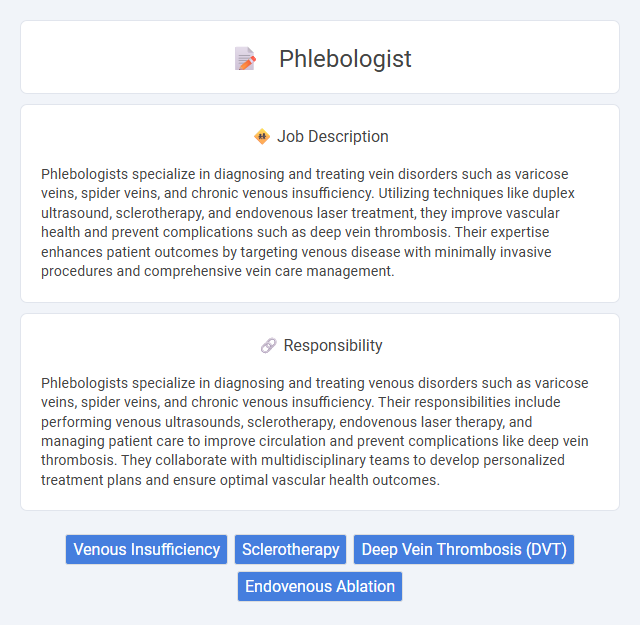
Phlebologists specialize in diagnosing and treating vein disorders such as varicose veins, spider veins, and chronic venous insufficiency. Utilizing techniques like duplex ultrasound, sclerotherapy, and endovenous laser treatment, they improve vascular health and prevent complications such as deep vein thrombosis. Their expertise enhances patient outcomes by targeting venous disease with minimally invasive procedures and comprehensive vein care management.
People with a strong interest in vascular health and a compassionate nature may be well-suited for a career as a phlebologist. Those who enjoy detailed diagnostics and patient interaction could find this specialization rewarding. Individuals who are comfortable working with patients suffering from varicose veins and other vein disorders might have a higher probability of success in this field.
Qualification
Phlebologists require specialized medical training in vascular medicine, often beginning with a degree in medicine followed by residency in dermatology, general surgery, or internal medicine. Certification in phlebology or completion of fellowship programs in venous disease enhances expertise in diagnosing and treating varicose veins, spider veins, and other venous disorders. Proficiency in ultrasound imaging and minimally invasive procedures is essential for effective patient care and successful treatment outcomes.
Responsibility
Phlebologists specialize in diagnosing and treating venous disorders such as varicose veins, spider veins, and chronic venous insufficiency. Their responsibilities include performing venous ultrasounds, sclerotherapy, endovenous laser therapy, and managing patient care to improve circulation and prevent complications like deep vein thrombosis. They collaborate with multidisciplinary teams to develop personalized treatment plans and ensure optimal vascular health outcomes.
Benefit
Phlebologists likely provide significant benefits by diagnosing and treating venous disorders, which can improve patients' quality of life and reduce the risk of complications like ulcers and blood clots. Their expertise may lead to minimally invasive treatments, resulting in shorter recovery times and less discomfort for patients. It is probable that their role also involves patient education, promoting long-term vein health and prevention strategies.
Challenge
Phlebologists likely encounter challenges in diagnosing and treating complex venous disorders due to overlapping symptoms with other conditions. The probability of needing advanced imaging techniques and minimally invasive procedures increases as vein diseases present in varied forms. Managing patient expectations and ensuring effective long-term care might also pose ongoing difficulties in this specialized medical field.
Career Advancement
Phlebologists specializing in vein care can advance their careers by obtaining board certification through organizations such as the American Board of Venous & Lymphatic Medicine. Gaining expertise in advanced procedures like endovenous laser therapy and ultrasound-guided sclerotherapy enhances professional credentials and patient outcomes. Leadership roles in multidisciplinary clinics or research initiatives contribute to career growth and recognition within vascular medicine.
Key Terms
Venous Insufficiency
Phlebologists specialize in diagnosing and treating venous insufficiency, a condition characterized by weakened or damaged veins causing poor blood flow and vein swelling. They employ advanced techniques like Doppler ultrasound and minimally invasive procedures such as sclerotherapy and endovenous laser treatment to restore proper circulation. Effective management by phlebologists reduces symptoms like varicose veins, leg pain, and swelling, significantly improving patient quality of life.
Sclerotherapy
Phlebologists specialize in diagnosing and treating venous disorders, with Sclerotherapy as a primary treatment for varicose and spider veins. This minimally invasive procedure involves injecting a sclerosant solution into affected veins to promote vessel closure and eventual absorption by the body. Expertise in ultrasound-guided Sclerotherapy enhances precision, ensuring effective results and reducing complications.
Deep Vein Thrombosis (DVT)
Phlebologists specialize in diagnosing and treating vein disorders, with a significant focus on Deep Vein Thrombosis (DVT), a dangerous condition caused by blood clots forming in deep veins, primarily in the legs. Their expertise includes performing ultrasound evaluations, prescribing anticoagulant therapies, and recommending lifestyle changes to prevent clot progression and complications such as pulmonary embolism. Advanced interventional procedures, including catheter-directed thrombolysis and vena cava filter placement, are critical components of managing severe DVT cases.
Endovenous Ablation
A phlebologist specializes in diagnosing and treating venous disorders, with expertise in endovenous ablation, a minimally invasive procedure used to close varicose veins using laser or radiofrequency energy. This technique targets the malfunctioning saphenous veins, promoting natural blood flow restoration and reducing symptoms such as leg pain and swelling. Phlebologists utilize ultrasound guidance during endovenous ablation to ensure precision and enhance patient recovery time.
 kuljobs.com
kuljobs.com